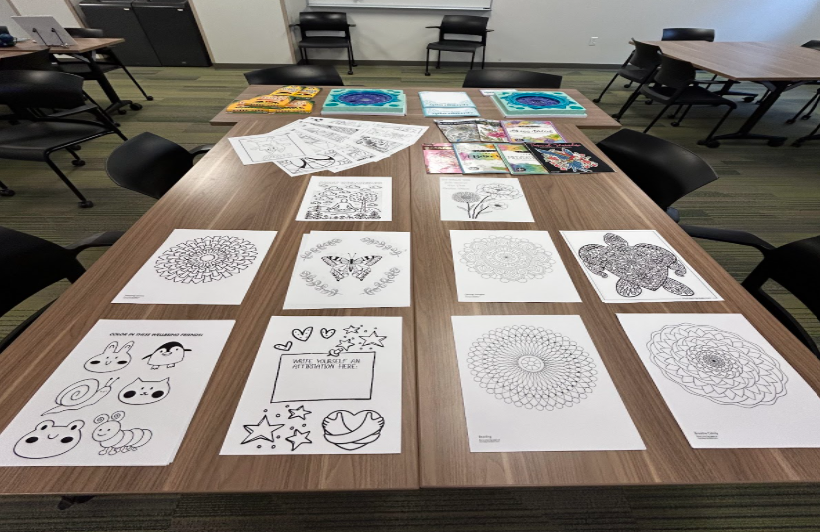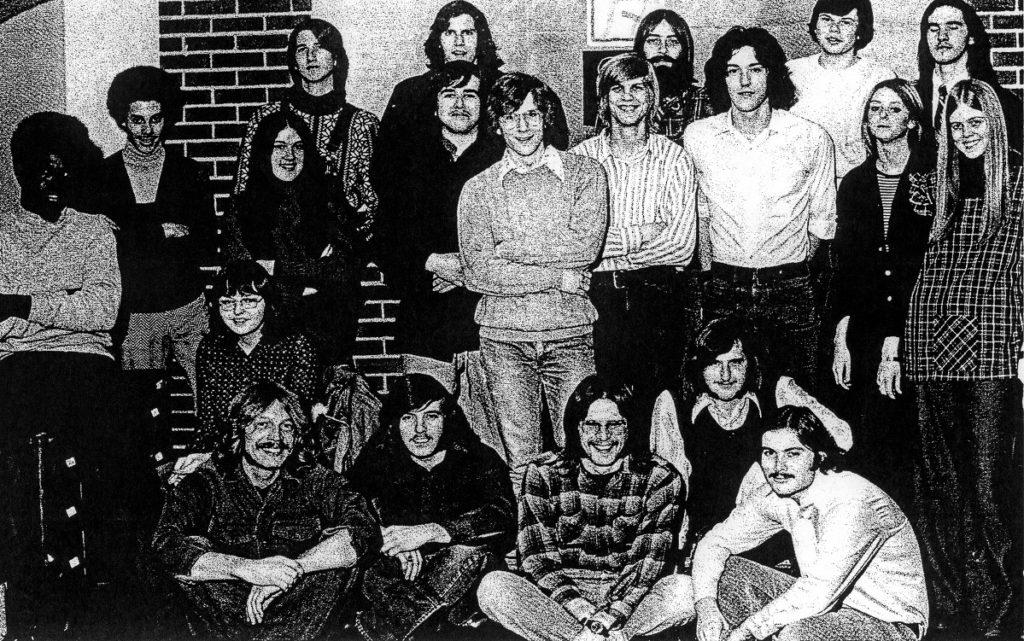When George “Buzz” Young arrived at NMU midway through his college career, he was studying political science and sociology. He graduated in 1974 with a degree in broadcasting and a sociology minor. He switched his major thanks in large part to his time at WBKX, the campus radio station that exists today as WUPX, more commonly known as Radio X.
Young joined WBKX in 1972. As a DJ, his shift ran from midnight to 2 a.m. four nights a week. Anyone who tuned in could expect to hear a hodgepodge of music. Young played everything from Aretha Franklin to Alice Cooper.
In his senior year, he was promoted to program director, which made him responsible for deciding who and what made it onto the air. His role at the station may have changed, but his passion for music never faded, even after graduation. Young is now retired and lives in Grosse Pointe, Michigan.
“I was in the record business in Detroit for 16 years, including 10 years owning my own small, independent record store in Grosse Pointe,” Young said. “WBKX prepared me in many ways by exposing me to different music.”
Trends in music come and go, so it’s no surprise that the music that was popular while Young was at NMU isn’t the same as today’s hits. Today the station is operated by a staff of four students, and over twenty DJs contribute to its nonstop programming.
Senior Joe Raasch is the current station manager. In addition to music, Raasch says listeners can tune in to hear a variety of programs. DJs are free to discuss almost anything. For example, some are interested in poetry, while others base their show around politics. Even faculty members are welcome to contribute. Raasch says Professor Joshua Ewalt recently began hosting a program where he interviews other faculty members.
“He talks to them about what’s their research,” Raasch said. “What are they looking into? What are they working on outside of class?”
Of course, Radio X maintains a strong focus on music. Some of the station’s staff, including Raasch, even host their own shows. Raasch’s show, entitled “Raasch n Roll,” plays jazz, alternative and indie music. Sophomore and Assistant Station Manager Julia Emery has a show as well.
“Mine is ‘The Carnival of Chaos’,’’ Emery said. “And I like to play EDM, so electronic dance music, and heavy metal.”
Emery enjoys working at the radio station, but it isn’t something she planned to do in college. She learned about Radio X as she was researching universities to attend after high school. She was intrigued by the organization, then, Raasch reached out.
“Joe sent out a mass email saying, ‘If you’re interested in being a DJ please sign up,’ and I just did it,” Emery said.
Emery will take over as station manager when Raasch graduates. Both students hope to see Radio X thrive as managers continue to train their successors for years to come. These sentiments are echoed by former station manager Frank Klim, who now resides in St. Petersburg, Florida.
“I think it’s excellent that NMU continues to have a student radio station at a time when some other universities don’t see the value in it,” Klim said.
Klim joined WBKX in 1971, one year after it began. He spent several years there, including half a year as the station manager in 1974. He values his time at the station immensely.
“The music was wonderful, the camaraderie was just great and the experience, the practical experience, was like nothing else,” Klim said. “And it provided a good foundation, along with the academics, for launching a career.”
The students at WBKX had almost complete control over their programming. Klim says record companies would frequently send in sample albums, and the station’s staff would decide which music to play. However, students didn’t always agree about which music was best, as Young recalls in an anecdote from his time at the station.
“We had one guy who was an engineer who was just incensed by the music of Frank Zappa,” Young said. “So he took a soldering iron to a record of Frank Zappa and ruined the tracks that he didn’t like so we couldn’t play them on the air.”
Although Radio X is similar to its predecessor in many ways, there are a few key differences. First, records are largely a thing of the past. The station now relies on digital streaming.
Secondly, some content that was broadcast in the 70s wouldn’t make it past the censors today. One example is streaking, which Merriam-Webster defines as, “to run naked through a public place.” Young says streaking briefly crazed American campuses in 1973, and NMU was no exception.
“I remember one night announcing that any bona fide streakers if they wanted to come up to the studio, I’d interview them,” Young said.
Several students responded to the offer and showed up for interviews completely naked. In retrospect, Young acknowledges that the trend was bizarre.
Between changing standards and COVID-19 restrictions, there is no room for streakers at Radio X today. Raasch, Emery and the rest of the staff and DJs abide by rules put in place by the Federal Communications Commission (FCC). They may not use profanity or air explicit content, including certain music.
“Make sure you listen to your music beforehand so nothing happens after,” Emery said.
For non-musical programming, Raasch says there are a few rules to keep in mind. Sexual and anatomical statements, calls to action and defamation of character are all forbidden on the air.
The station wasn’t always subject to the FCC’s rules. In the 70s, the term “campus radio station” was much more literal. The signal was broadcast via carrier current transmission and it could only be heard on campus.
“The signal was carried to the dorms through the electrical grid, so our audience was almost exclusively in the dorms,” Young said.
Klim also recalls the limitations of carrier current. He says the signal was carried through wires buried beneath the buildings, which is why it couldn’t be heard outside of NMU. Regardless, he appreciates the value of such a system.
“At the time it was really the only opportunity for college music in the area,” Klim said.
When the station started in 1970 they chose the call letters WBKX. Young says this was done to mimic a popular radio station at that time, WABX in Detroit. In 1993, NMU’s student radio station applied for a license from the FCC and began broadcasting at 91.5 FM. However, the FCC forbade them from identifying as WBKX. Thus, the station adopted its current call letters, WUPX.
With the switch to FM radio came a wider reach. Listeners were no longer limited to NMU’s campus. Eventually, the station began streaming online, meaning anyone with an internet connection could tune in.
The technology has improved over the last half-century, but the station’s goals have remained largely unchanged. WBKX’s first station manager was Mike Kinosian, who now lives in Los Angeles. Kinosian was the station manager during his senior year at NMU, from 1971 to 1972. When he was appointed by the university’s radio board, he had some simple goals in mind.
“First and foremost, I wanted our audience exclusively of Northern students, administration, faculty, and staff to hear an entertaining, informative product of which they could be pleased,” Kinosian said. “For the WBKX staff, my mission was for them to have fun every second they were inside the station and recall the experience with the utmost of positivity. It was essential to me that each person – regardless of their ultimate career path post-graduation – could realize they were part of a winning team that helped make a difference.”
Indeed, Raasch and Emery say the station has made a difference, evidenced in the lives of alumni who come to visit.
“This doesn’t leave them,” Emery said. “Radio X is most likely going to be a part of themselves for the rest of their lives.”
Klim hopes students cherish what Radio X has to offer, whether it be programming streamed online, or in person social events held after the pandemic.
“I would take as much advantage of that opportunity as possible,” Klim said.
Raasch and Emery emphasize that the station is not limited to those pursuing a career in broadcasting. Emery is a forensic biochemistry major. Raasch is now majoring in communications, but that wasn’t always the case.
“When I first started here I was an outdoor recreation major,” Raasch said. “That is the complete opposite of any sort of broadcasting imaginable.”
Emery has some words of encouragement for any students who may have doubts about joining the station.
“If I can do it, and Joe can do it, and that’s not our major, you can do it as well,” Emery said.
For more information, DJ applications, and the Radio X Mixlr livestream, click here.
































